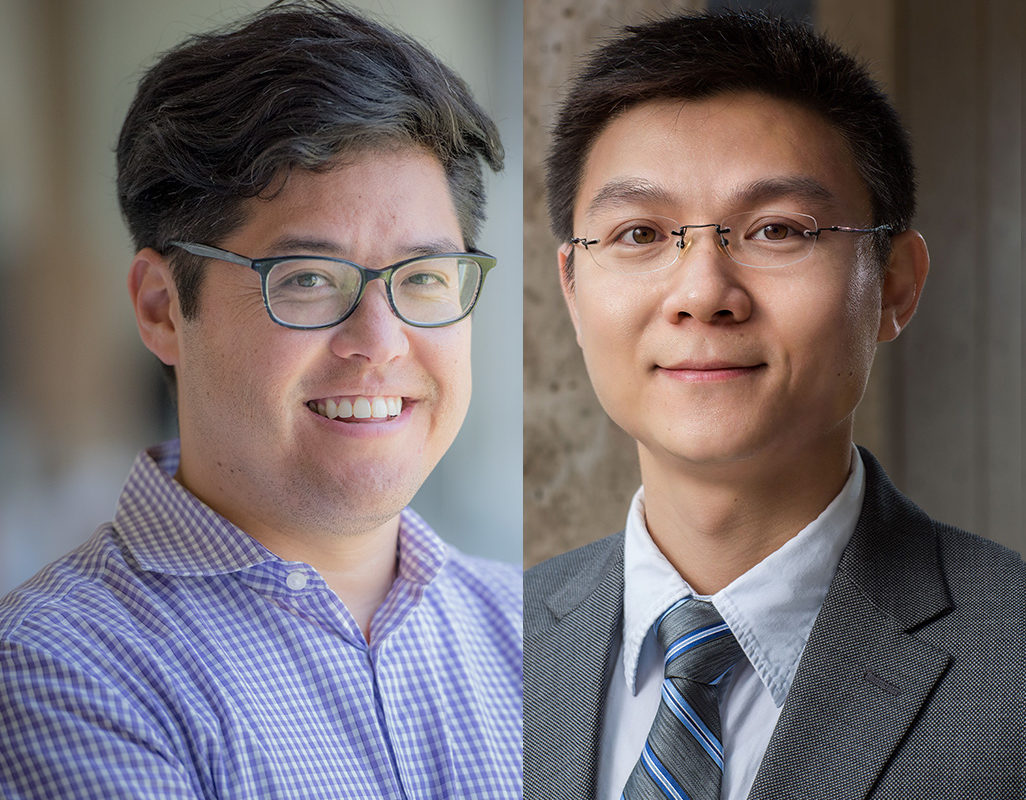
It’s hard to obtain research funding for safe ideas, and it’s even harder to find funding for risky ones. But thanks to the National Institutes of Health (NIH) Director’s Awards, USC Stem Cell scientists Justin Ichida and Zhongwei Li have secured the funding to pursue their high-risk, high-reward ideas for treating ALS and kidney disease.
The NIH Director’s Awards honor exceptionally creative scientists proposing unconventional approaches for addressing major challenges in biomedical and behavioral research. The awards are supported by the NIH Common Fund as part of the High-Risk, High-Reward Research program, which recognizes scientists who think beyond traditional bounds and pursue trailblazing ideas that advance knowledge and enhance health.
“These awards are given to scientists who push the boundaries of what is possible,” said Andy McMahon, director of the Eli and Edythe Broad Center for Regenerative Medicine and Stem Cell Research at USC. “This is what Drs. Ichida and Li have always done and will continue to do in their research, and I’m delighted that they’ve received these awards.”
Ichida is the recipient of a $4.971 million NIH Director’s Transformative Research Award, which promotes cross-cutting, interdisciplinary research that challenges existing paradigms. Along with co-principal investigator Hani Goodarzi from the University of California, San Francisco, Ichida will pioneer an improved approach for using patient-derived cells to discover drugs to treat amyotrophic lateral sclerosis, also known as ALS or Lou Gehrig’s disease.
ALS is a fatal neurodegenerative disease that can arise in patients with no known genetic cause, or with one of several different genetic mutations. The disease’s diverse genetic underpinnings make it more difficult to identify a single treatment that will be universally effective for all patients.
“We need to identify drugs that are likely to be either broadly effective for all patients, or specifically effective for patients with particular mutations,” said Ichida, who is the John Douglas French Alzheimer’s Foundation Associate Professor of Stem Cell Biology and Regenerative Medicine at USC, and a New York Stem Cell Foundation-Robertson Investigator. “To accomplish this, it’s critical to be able to efficiently screen the effects of potential drugs on motor neurons derived from a large number of different patients with ALS.”
Traditional screenings are based on visual observations of how drugs affect motor neurons’ physical characteristics. This approach requires the painstaking labor of scientists, who spend countless hours characterizing the appearance and survival of motor neurons derived from one patient at a time. The new, less labor-intensive screening approach will be based on how drugs affect motor neurons’ genetic activity and survival, which can be measured in cells derived from dozens of different patients simultaneously.
“Our powerful new approach will enable us to more quickly and efficiently identify therapeutic drugs with the potential to treat multiple forms of ALS,” said Ichida.
Li has received a $2.475 million NIH Director’s New Innovator Award, which supports unusually innovative research from early career investigators. Li will use the award to advance his progress towards generating a synthetic kidney for patients in need of transplants.
To build a synthetic kidney, Li will combine natural developmental cues with bioengineering to direct stem cell-like progenitor cells to begin self-assembling in the laboratory. He will then transplant the resulting kidney structure, which will still be in an embryonic-like state, into the abdomen of a recipient. Once transplanted, the synthetic kidney will continue to grow and mature into a functional synthetic kidney.
“By working towards the creation of a synthetic transplantable kidney that can grow and mature into a functional organ in the recipient’s own body, our project aims to address the current shortage of donor kidneys,” said Li, who is an assistant professor of medicine in the Division of Nephrology and Hypertension and USC/UKRO Kidney Research Center, and of stem cell biology and regenerative medicine at USC. “Our long-term goal is to create a revolutionary new treatment strategy for the millions of patients with chronic kidney disease and end-stage renal disease.”
In total, this year’s High-Risk, High-Reward Research Program awarded 103 new grants totaling approximately $285 million to highly innovative scientists pursing visionary and impactful biomedical and behavioral research.
“The science advanced by these researchers is poised to blaze new paths of discovery in human health,” said Lawrence A. Tabak, who is performing the duties of the Director of NIH. “This unique cohort of scientists will transform what is known in the biological and behavioral world. We are privileged to support this innovative science.”
